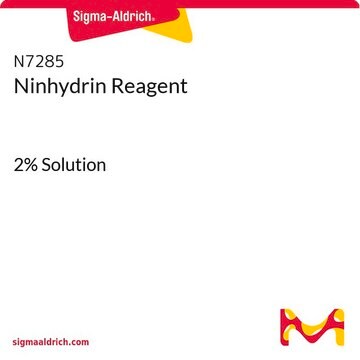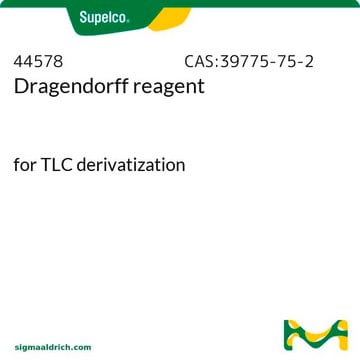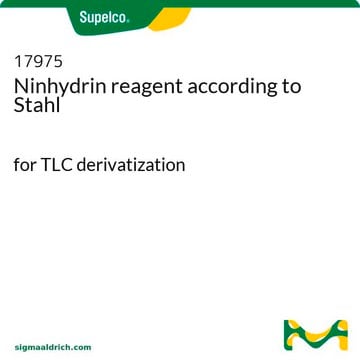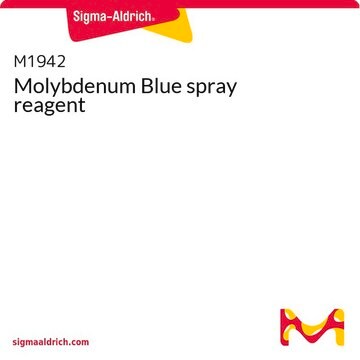N0507
Ninhydrin spray reagent
0.2% in ethanol
Synonim(y):
Ninhydrin solution
Zaloguj sięWyświetlanie cen organizacyjnych i kontraktowych
About This Item
Wzór empiryczny (zapis Hilla):
C9H6O4
Numer CAS:
Masa cząsteczkowa:
178.14
Numer MDL:
Kod UNSPSC:
12352100
Identyfikator substancji w PubChem:
Polecane produkty
Postać
liquid
Poziom jakości
stężenie
0.2% in ethanol
temp. przechowywania
2-8°C
ciąg SMILES
OC1(O)C(=O)c2ccccc2C1=O
InChI
1S/C9H6O4/c10-7-5-3-1-2-4-6(5)8(11)9(7,12)13/h1-4,12-13H
Klucz InChI
FEMOMIGRRWSMCU-UHFFFAOYSA-N
Szukasz podobnych produktów? Odwiedź Przewodnik dotyczący porównywania produktów
Zastosowanie
amino acids, amines and amino sugars.
This page may contain text that has been machine translated.
zastąpiony przez
Numer produktu
Opis
Cennik
Certyfikaty analizy (CoA)
Poszukaj Certyfikaty analizy (CoA), wpisując numer partii/serii produktów. Numery serii i partii można znaleźć na etykiecie produktu po słowach „seria” lub „partia”.
Masz już ten produkt?
Dokumenty związane z niedawno zakupionymi produktami zostały zamieszczone w Bibliotece dokumentów.
Matthew G Romei et al.
Science (New York, N.Y.), 367(6473), 76-79 (2020-01-04)
Rotation around a specific bond after photoexcitation is central to vision and emerging opportunities in optogenetics, super-resolution microscopy, and photoactive molecular devices. Competing roles for steric and electrostatic effects that govern bond-specific photoisomerization have been widely discussed, the latter originating
Yu-Feng Xie et al.
Journal of neurochemistry, 122(3), 605-618 (2012-05-23)
Neurons located in the trigeminal subnucleus caudalis (Vc) play crucial roles in pain and sensorimotor functions in the orofacial region. Because of many anatomical and functional similarities with the spinal dorsal horn (SDH), Vc has been termed the medullary dorsal
Mendel Friedman
Journal of agricultural and food chemistry, 52(3), 385-406 (2004-02-05)
The reaction of ninhydrin with primary amino groups to form the purple dye now called Ruhemann's purple (RP) was discovered by Siegfried Ruhemann in 1910. In addition, imines such as pipecolic acid and proline, the guanidino group of arginine, the
Chao Li et al.
Journal of biomaterials science. Polymer edition, 23(1-4), 405-424 (2011-02-12)
Biomaterials have been playing important roles in cartilage regeneration. Although many scaffolds have been reported to enhance cartilage regeneration, none of the scaffolds available are optimal regarding mechanical properties, integration with host cartilage and providing proper micro-environment for chondrocyte attachment
Jianhui Gu et al.
Journal of tissue engineering and regenerative medicine, 6(2), 163-168 (2011-03-04)
This paper describes a clinical case study in which a chitosan/polyglycolic acid nerve guidance conduit (chitosan-PGA NGC) was utilized to repair a 30 mm long median nerve defect in the right distal forearm of a 55 year-old male patient. Thirty-six
Nasz zespół naukowców ma doświadczenie we wszystkich obszarach badań, w tym w naukach przyrodniczych, materiałoznawstwie, syntezie chemicznej, chromatografii, analityce i wielu innych dziedzinach.
Skontaktuj się z zespołem ds. pomocy technicznej